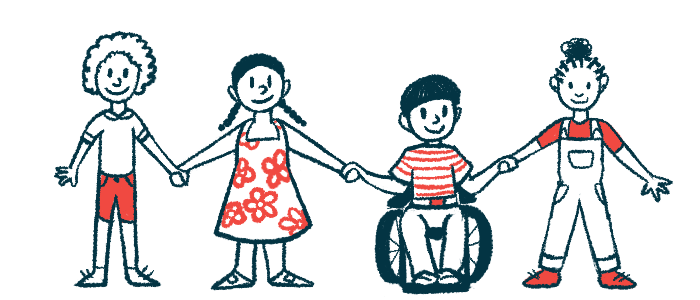CBD seen to reduce drug-resistant seizures in Rett children by half
Oral cannabidiol as add-on treatment worked for two-thirds of study patients
Written by |

Using an oral cannabidiol (CBD) solution as an add-on treatment to antiseizure medications was shown to lower the frequency of drug-resistant seizures by more than half in about two-thirds of children with Rett syndrome in a study conducted in Italy.
“Our findings suggest a strong trend toward the efficacy of CBD in reducing seizure frequency,” the researchers wrote, noting that a majority of Rett children experienced a drop in seizure frequency of at least 50%.
Many patients also showed improved behavior and attention, and some had better sleep quality. This was particularly seen for those children those who responded to the treatment, the scientists noted. The study also enrolled children with CDKL5 Deficiency Disorder (CDD), a genetic condition that shares symptoms with Rett, including seizures.
“The consistency of the response, combined with the absence of seizure aggravation and a favorable safety profile, highlights purified cannabidiol … as a promising therapeutic option for individuals with [Rett] and CDD,” the researchers wrote.
Titled “Is highly purified cannabidiol a treatment opportunity for drug-resistant epilepsy in subjects with typical Rett syndrome and CDKL5 deficiency disorder?” the study was published in the journal Epilepsia Open.
In most cases, Rett is caused by mutations in the MECP2 gene, which result in low levels of a protein of the same name that regulates the activity of other genes. The MeCP2 protein helps maintain nerve cell connections and is essential for normal brain development and function.
As such, these mutations result in disease symptoms, namely growth and motor issues, communication problems, breathing and heart difficulties, and seizures. Seizures are a key Rett symptom that may affect more than 60% of patients.
CBD approved in US to treat seizures associated with other conditions
In this study, researchers from institutions across Italy evaluated the safety and efficacy of oral CBD as an adjunctive therapy for drug-resistant seizures in people with Rett and CDD.
CBD is a compound isolated from the cannabis plant that has neuroprotective properties but does not cause psychoactive effects. It is approved under the brand name Epidiolex in the U.S. for the treatment of drug-resistant seizures associated with Dravet syndrome and Lennox-Gastaut syndrome, two severe forms of childhood-onset epilepsy.
A total of 27 participants — including 14 diagnosed with Rett — were enrolled through the national CBD-RTT Syndrome Study Group. The cohort’s median age was 10.5 years, and most participants were girls. The most common seizure types were tonic seizures (37%), characterized by muscle stiffening, and tonic-clonic seizures (25.9%), in which muscle stiffening is followed by rhythmic jerking of the limbs.
The participants were given CBD as an add-on therapy for at least six months. Treatment was started at a dose of 5 mg/kg/day and gradually increased up to 20 mg/kg/day depending on the medication’s tolerability and effectiveness. After a median of 14 months, participants received a median dose of 15 mg/kg/day.
CBD was taken together with a mean of three antiseizure medications, most commonly clobazam, carbamazepine, and valproic acid.
Although the results were not statistically significant, CBD treatment was associated with an overall reduction in seizure frequency — especially tonic seizures — with about two-thirds of participants experiencing at least a 50% decrease compared with baseline, or the study’s start. Seven participants (25.9%) had their seizures reduced by more than 75%.
Some children also showed improved attention, had better sleep
Among the 14 participants with Rett, nine (64.3%) had at least a 50% reduction in seizures. Seizure outcomes were not linked to age at diagnosis, age at seizure onset, or use of antiseizure medications, the team also found.
According to caregiver reports, 12 participants (44.4%) showed improved attention and responsiveness, five (18.5%) experienced better sleep quality, and three (11.1%) demonstrated enhanced motor function. Behavioral improvements were particularly seen in patients with a seizure reduction of at least 50%, compared with those who experienced no changes in seizures (63.6% vs. 22.2%).
While [the] results were not statistically significant, they suggest CBD may benefit seizure control and quality of life in [Rett] … patients.
Most participants tolerated CBD well, with generally mild side effects, including somnolence, irritability, and loss of appetite.
“While [the] results were not statistically significant, they suggest CBD may benefit seizure control and quality of life in [Rett] … patients,” the researchers wrote.
The team called for future studies into ways to reduce treatment-resistant seizures.
“Identifying the optimal treatment approaches for seizure control continues to be a high priority for further research, in order to reduce the seizure burden and to optimize the balance between side effects and seizure control,” the researchers wrote in a section titled “Clinical Relevance/Future Directions.”
One key limitation noted was the study’s small number of participants, which is common in rare diseases research.







